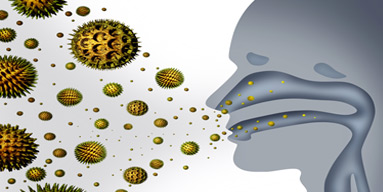Indoor Air Quality: How Spring Affects Our Air Quality
Spring has sprung! Pollen, mold, mildew, and dust are circulating in our air making for extremely poor indoor quality. If not maintained, these Springtime pollutants can have a big negative effect on you and your family’s health.
Indoor Air Quality Adverse Effects
- – Itchy Eyes
- – Congestion
- – Body Aches
- – Runny Nose
- – Coughing
- – Sneezing
- – Fatigue
- – Headache
- – Dry Skin
 Allergens such as pollen are in abundance in Spring and the leading cause of congestion and allergy flare ups. One of the reasons this contaminants flourishes during Spring is our tendency to “air out” our homes by opening the windows. This allows the pollen allergens to have full access to our sinuses.
Allergens such as pollen are in abundance in Spring and the leading cause of congestion and allergy flare ups. One of the reasons this contaminants flourishes during Spring is our tendency to “air out” our homes by opening the windows. This allows the pollen allergens to have full access to our sinuses.
Spring showers leaves dampness and moisture where mold and mildew find easy conditions to grow rapidly.
Throughout the entire year, your HVAC system pulls dust and debris into your ductwork settling to be recirculated as your air conditioning system works. This cycle of circling the dust in and out of the house will continue until the ducts are thoroughly cleaned. During Spring, outdoor pollutants and allergies have your sinuses and breathing labored, additional dust and debris from your ductwork can send your health spiraling downward.
What is the Roll of Your HVAC Systems for Healthy Indoor Air Quality?
Your heating and air conditioning systems filters and cleans your indoor air, maintains humidity levels, and provides comfortable temperatures. If properly maintained, HVAC systems will help filter that springtime pollen out of your home and will minimize the risk of mold growth by monitoring humidity levels.
Your HVAC Air Filter is a Crucial Component to Indoor Air Quality
A common problem for many homeowners is your AC unit “freezing up.” This is when your HVAC system is overworked. Its effectiveness becomes compromised and electricity usage can increase drastically.
Leading Causes of A/C Freeze Ups
Your HVAC evaporator coil drops too low, your system will begin to ice up. Hot airflow has become obstructed. Rather than moving hotter air from your home, the evaporator’s coils begin the transference of ice-cold air. Such an occurrence is an example of poor system airflow.
Here are the leading causes of poor airflow:
- – Clogged or dirty air filters
- – Lack of refrigerant level
- – Curtain/drapery/furniture obstructions for air returns
- – Dirty or clogged coils
- – Poorly functioning or malfunctioning system fans
Repair It Now or It Will Cost You
If you notice that your HVAC system is performing poorly, running excessively, your utility bill skyrockets, noises or smells are coming from your air conditioning unit, call for service immediately. Fixing an air conditioning system quickly as issues are noticed, will reduce expensive repair down the road.